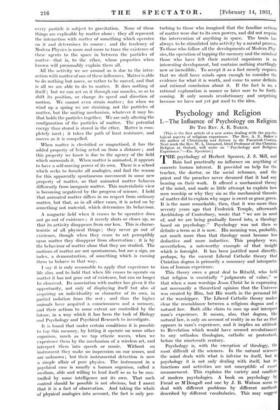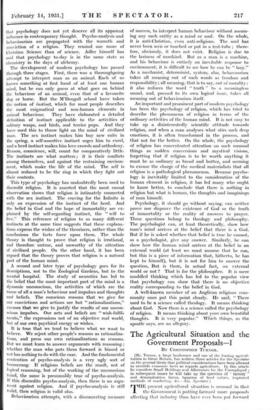Psychology and Religion
I.—The Influence of Psychology on Religion
By THE REV. A. E. BAKER.
[This is the first article of a new series dealing with the psycho- logical aspects of religious experience. The Rev. A. E. Baker is the author of Christianity and Science in the Twentieth Century. Next week the Rev. W. L. Grensted, Oriel Professor of the Christian Religion at Oxford, will write on " Psychology and Religious Experience."—En. Spectator.] THE psychology of Herbert Spencer, J. S.- Mill, and Bain had practically no influence on anything of concrete human interest. It provided no help for the teacher, the doctor, or the social reformer, and the priest and the preacher never dreamed that it had any bearing on their work. It offered a mechanical theory of the mind, and made as little attempt to explain how men worship or why they sin as the mechanical theories of matter did to explain why sugar is sweet or grass green. It is the more remarkable, then, that it was more than seventy years ago that Frederick Temple, afterwards Archbishop of Canterbury, wrote that " we are in need -of, and we are being gradually forced into, a theology based on psychology." Psychology was not then so definite a term as it is now. His meaning was, probably, not much more than that theology must become less deductive and more inductive. This prophecy was, nevertheless, a noteworthy example of that insight which is foresight. It has been justified most directly, perhaps, by the current Liberal Catholic theory that Christian dogma is primarily a summary and interpreta- tion of human experience.
This theory owes a great deal to Ritschl, who held that religion is essentially " judgments of value," so that when a man worships Jesus Christ he is expressing, not necessarily a theoretical opinion that the Universe was created by Him, but His worth in the personal life of the worshipper. The Liberal Catholic theory makes clear the resemblance between a religious dogma and a natural law. Both alike claim to sum up and interpret man's experience. It means, also, that dogma, like natural law, is only an account of reality in so far as that appears in man's experience, and it implies an attitude to Revelation which would have seemed revolutionary to any orthodox theologian, catholic or protestant, before the nineteenth century.
Psychology is, with the exception- of theology, the most difficult of the sciences. In the natural sciences the mind deals with what is inferior to itself, but is psychology it is not only dealing with itself,- but its functions and activities are not- susceptible. of exact measurement. This explains the variety and conflicts of modern psychologies. A book on psychology by Freud or M'Dougall and one by J. B. Watson seem to deal with different problems by- different methods described by different vocabularies. This may suggest that psychology does not yet, deserve all its apparent influence in contemporary thought. Psycho-analysis and behaviourism are propagated with the warmth and conviction of a religion. They remind one more of Christian Science than of science. Adler himself has said that psychology to-day is in the same state as chemistry in the days of alchemy.
The development of modern psychology has passed through three stages. First, there was a thoroughgoing attempt to interpret man as an animal. Each of us knows something at first hand of at least one human mind, but he can only guess at what goes on behind the behaviour of an animal, even that of a favourite dog or horse. But the M'Dougall school have taken the notion of instinct, which for most people describes the most enigmatical and non-human elements in animal behaviour. They have elaborated a detailed definition of instinct applicable to the activities of solitary wasps, and birds, and terrier pups. And they have used this to throw light on the mind of civilized man. The sex instinct makes him buy new suits in the spring, a self-assertive instinct urges him to excel, and a herd instinct makes him love crowds and orthodoxy. Reason, conscience, will, count for comparatively little. The instincts are what matters ; it is their conflicts among themselves, and against the restraining environ- ment, which make the life of the mind. The self is almost reduced to be the ring in which they fight out their contests.
This type of psychology has undoubtedly been used to discredit religion. It is asserted that the most casual observation shows that religion is intimately connected with the sex instinct. The craving for the Infinite is only an expression of the instinct of the herd. And the belief in God and the hope of immortality are ex- plained by the self-regarding instinct, the " will to live." This reference of religion to so many different instincts at the same time suggests that these explana- tions express the wishes of the theorizers, rather than the conclusions the facts force upon them. The whole theory 'is thought to prove that religion is irrational, and therefore untrue, and unworthy of the attention of civilized people. On the other hand, it has been argued that the theory proves that religion is a natural part of the human mind.
A second and later type of psychology goes for its descriptions, not to the Zoological Gardens, but to the mental hospital: The study of neurotics has led to the belief that the most important part of the mind is a dynamic unconscious, the activities of which are the cause of all a man's behaviour and impulses and thoughts and beliefs. The conscious reasons that we give for our convictions and actions are but " rationalizations," excuses that we give to justify the results of our uncon- scious impulses. Our acts and beliefs are " wish-fulfil. ments," the expressions not of an objective real world, but of our own psychical energy or wishes.
It is true that we tend to believe what we want to believe. We reject other people's reasons as rationaliza- tions, and press our own rationalizations as reasons. But we must learn to answer arguments with reasoning ; whether the man who puts them forward is biased or not has nothing to do with the case. And the fundamental contention of psycho-analysis is a very ugly sort of boomerang. If religious beliefs are the result, not of logical reasoning, but of the working of the unconscious mind, the same is presumably true of psycho-analysis. If this discredits psycho-analysis, then there is no argu- ment against religion. And if psychos-analysis is still valid, then religion is valid also.
Behaviourism attempts, with a disconcerting measure of success, to interpret human behaviour without assum- ing any such entity as a mind or soul. On the whole, it is anti-Christian, even anti-religious. The soul has never been seen or touched or put in a test-tube ; there- fore, obviously, it does not exist. Religion is due to the laziness of mankind. But as a man is a machine, and his behaviour is entirely an inevitable response .to environment, it is difficult to see how he can be " lazy." As a mechanist, determinist, system, also, bchavourism takes all meaning out of such words as freedom and responsibility; all meaning, that is to say, out of morality; it also reduces the word " truth " to a meaningless sound, and, pressed to its own logical issue, takes all meaning out of behaviourism itself.
An important and prominent part of modern psychology has been the psychology of religion, which has tried to describe the phenomena of religion in terms of the ordinary activities of the human mind. It is not easy to take up a disinterestedly scientific attitude towards religion, and when a man analyses what stirs such deep emotions, it is often transformed in the process, and that not for the better. On the whole, the psychology of religion has concentrated attention on such unusual things as sudden conversions and mystical visions, forgetting that if religion is to be worth anything it must be as ordinary as bread and butter, and seeming to excuse the charge of the medical materialists that all religion is a' pathological phenomenon. Because psycho- logy is inevitably limited to the consideration of the human element in religion, it has led many who ought to know better, to conclude that there is nothing in religion but what is human, the thoughts and imaginings Of man himSelf.
Psychology, it should go without saying, can neither prove nor disprove the existence of God Or the truth of immortality or the reality of answers to prayer. These questions belong to theology and philosophy. The psychologist can, at least theoretically, show how man's mind arrives at the belief that there is a God. But 'if he is asked whether-that belief is trite lie cannot, as a psychologist, give any answer. Similarly, he can Show how the human mind arrives at the belief in an external world (at least we must assume that lie can, but this is' a piece of information that, hitherto, he has kept to himself), but it is not for him to answer the question, But is there, in actual fact, an external world or not ? That is for the philosopher. It is mere muddled thinking which has led to the popular view that psychology can show that there is no objective reality corresponding to the belief in God.
A well-known member of an Anglican religious com- munity once put this point clearly. He said, " There used to be a science called theology. It means thinking about God. Now there is a science called the psychology of religion. It means thinking about your own beautiful thoughts. It is Very popular." Which things, as the apostle says, are an allegory.
















































 Previous page
Previous page